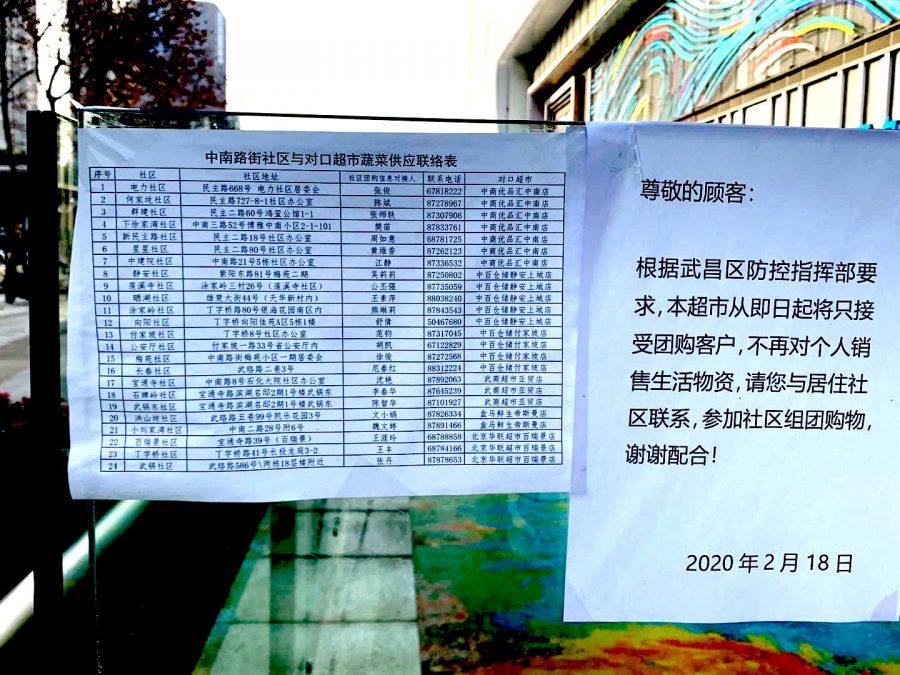In Wuhan, lockdown challenges business and individual’s livelihoods
A notice in front of a supermarket in Wuhan: according to the regulation, this supermarket will not accept individual purchase, only group purchase. Photo courtesy: Yuheng Zhang
February 28, 2020
Food prices are on the rise. Money is short. Employees are required to alert their companies daily about their body temperature. Students are taking all their classes online.
This is the grim picture for workers in Wuhan, China, where the coronavirus started. More than a month after the city was basically shut down, with residents ordered to stay home, people are worried about how they will pay the rent or buy food, because most of them have been unable to work. Smaller companies, restaurants and mom-and-pop stores are losing business at what is usually the busiest time of year and some are in danger of closing for good.
It’s a picture of what life could be like for other cities around the globe, if governments take strict measures to prevent the spread of COVID-19, as the coronavirus is known formally.
There have been major changes since the outbreak including movement restrictions placed on the citizens by authorities. The Global Observer interviewed a resident of Wuhan, Yuheng Zhang, about life in the city.
Zhang said before the virus, it was simple to get food. He would place an order online and the food would be outside his door when he came home from work.

Now “there is no way to deliver food to the door,” he said, because many of the delivery people are not working. People have started to go online to find food instead, but that proved to be challenging as well “it is difficult for people to scramble for life supplies online because everyone is trying to do that.”
Zhang said prices of food, such as fresh vegetables, are higher than normal and he cannot go out to eat either.
“I haven’t gone to the restaurants that I love for a long time,” he said, including places he frequented like the milk tea stores, hot pot restaurants and other places. Restaurants that do not offer delivery have closed and when they will re-open is uncertain. Some may never reopen due to business loss during this period.
Zhang, who does marketing for a small company, said for a while he was able to visit the supermarket, but even that was difficult because of the protective measures he needed to take.
Supermarkets only allowed in people who were wearing masks, used portable hand sanitizers provided at the door and had their body temperatures tested. There was no staff in the store to help, a change uncharacteristic of a Chinese supermarket. Zhang had to find everything himself and use self-service checkout.
Recently, Zhang said, there has been a change in food buying regulations. Some supermarkets no longer accept individual purchase and only accept group purchases, which makes it tough for Zhang, who lives by himself, to get food. Buyers must also spend a minimum amount in order to make any purchase, meaning people may have to buy items they do not need.

Due to the quarantine, all theaters, malls, shows and amusement parks are closed, too. It is an especially hard time for small businesses, since they have to pay for rent and employees’ salaries. This time of year, the Spring Festival, has always been the busiest season for these stores, much like Christmas for stores and restaurants in the West.
Although Zhang is one of those lucky few who are able to work online, the ripple effect means that his salary hasn’t been paid on time, including the year-end bonus. “So far, I haven’t been paid for a month,” Zhang said. “It’s a burden because there is overhead, I have to pay rent, to buy necessities and to stock up [on life supplies].”
His company also requires him to submit his temperature every day, so they can monitor his health.
As of the time this story is published, Zhang has been staying at home for more than 28 days. He said he has no idea when he will be able to return to work as the date keeps being delayed. The latest return date for him is now March 10, but he said he is not sure if there will be another delay.
And after the outbreak ends? Zhang worries that the city has been tarnished in people’s minds and the local tourism industry will struggle. Spring usually brings many tourists to the city as March is a wonderful time of the year to see cherry blossoms in Wuhan. But this year, it will be a difficult spring.


